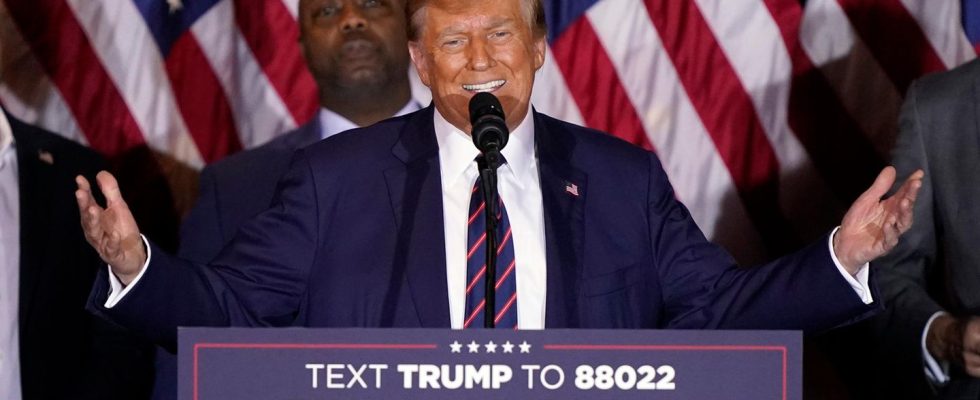US election campaign
Won two primaries and still the path to the White House is uncertain: What is Trump’s problem?
Donald Trump at a pre-election party
© Pablo Martinez Monsivais / AP / DPA
Donald Trump wants to return to the White House. But not all Republican voters rave about the populist. This could not only be a problem for Trump, but also for his party.
The victories against Nikki Haley – the only remaining rival in the Republican race – were clear. But the result also shows that Trump cannot be sure of the support of independent voters and moderate Republicans. But he depends on their votes if he wants to win against Democratic President Joe Biden in November.
Nearly half of New Hampshire voters are registered independents. This group reflects the mood in the swing states, i.e. in the states without a clear Republican or Democratic majority, but which are likely to be decisive for the outcome of the presidential election in the fall. In the primaries, twice as many of them voted for the more moderate Haley than for the more radical Trump.
In a survey of Republican voters in New Hampshire, a third said they would definitely not vote for the ex-president in November – another alarm signal for the Trump camp. A trend that was also observed in Iowa. Trump clearly won among Republicans there, but according to a poll by the local newspaper Des Moines Register, almost half of Haley’s supporters would rather vote for Biden than for the real estate billionaire.
Primaries: no landslide victory for Donald Trump so far
“Many portray Trump’s result in Iowa as outstanding, but I disagree,” said Kenneth Miller, a political science professor at the University of Nevada, Las Vegas. “He started out as the clear frontrunner and campaigned for two years without his primary competitors saying a single bad word about him. Those are pretty much the most favorable conditions you can imagine. Nevertheless, he cracked Iowa just under 50 percent.”
In Iowa, Trump still had to assert himself against other competitors: In addition to Haley, Ron DeSantis also ran there. After his defeat, the governor of Florida withdrew his candidacy. But even in the more liberal New Hampshire, with Haley as the only opponent, there was no landslide victory for the ex-president: he ended up with 55 percent.
The question is whether Trump can win over voters beyond his loyal base. After his withdrawal, DeSantis pledged his support to Trump, but publicly doubted that he would be able to win over old-school Republicans to his side. “When people come to me who voted for Ronald Reagan in 1976 and have been conservatives all their lives and tell me they don’t want to vote for Trump again, that’s a problem,” DeSantis said in a radio interview .
Trump’s inability to convince more moderate party supporters has already led to a series of election defeats in recent years. Not only did he fail in the 2020 presidential election against Biden, the Republicans also lost both chambers of Congress during his term and also suffered significant setbacks in the 2022 midterm elections.
Trump cannot win over all Republican voters
Nevertheless, Trump sticks to his strategy: He stirs up fears, incites against immigrants, insults opponents, spreads conspiracy theories and still repeats the lie that he actually won the presidential election in 2020 – most recently in his victory speech in New Hampshire. Trump can inspire his hardcore fans with this, but he scares other Republicans with it.
But that is not the populist’s only problem: there are 91 charges against him and he has to face four trials. At least one trial could begin before Election Day. It cannot be ruled out that Trump will be a convicted criminal by November 5th.
During the first two Republican primaries, voters were asked whether they thought Trump would be fit to serve as president even after a conviction. Just over a third of Iowa voters and nearly half of New Hampshire voters said no. In other words: Many of his supporters are ready to forgive Trump anything. But there are quite a few for whom there are limits.
And that could be crucial, says political scientist Nicholas Creel from GCSU University in Georgia. “Our presidential elections have been so close recently that even a small loss of support within your own party can quickly prove fatal.”

